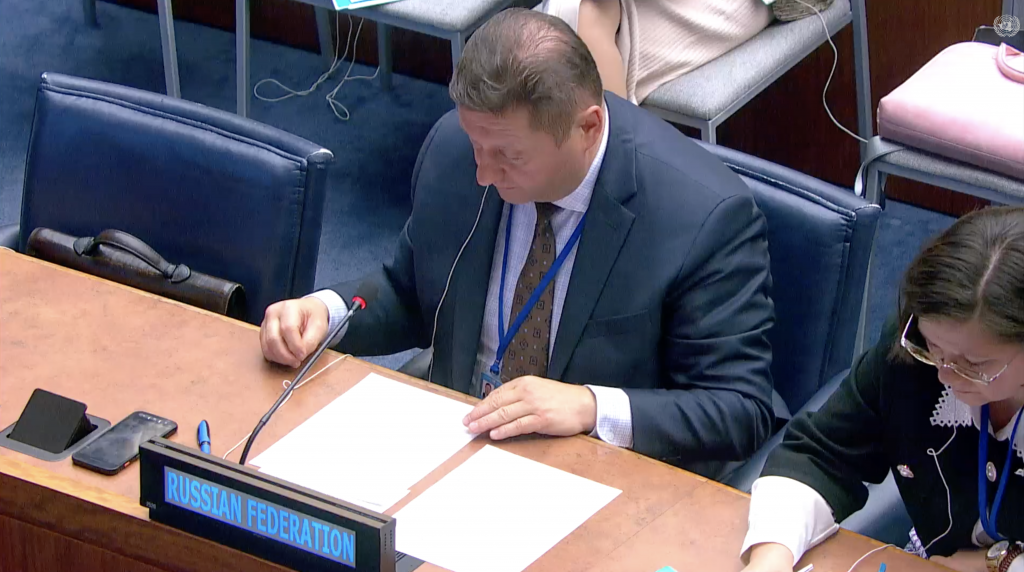Statement by Andrey Belousov, Deputy Head of the Delegation of the Russian Federation, at the Thematic Debate on Other disarmament measures and international security in the First Committee of the 78th Session of the UNGA
Mr. Chair,
This year marks the 25th anniversary since the discussion on security in the use of information and communications technologies (ICTs) was launched upon the initiative of the Russian Federation in 1998. Over this time, States managed to achieve significant progress in elaborating measures to strengthen peace and security in information space. However, a lot more needs to be done to shape a system of international information security based on prevention of conflicts, encouraging peaceful use of ICTs, respect for States’ sovereignty and non-interference in their internal affairs. As we continue this work under the auspices of the United Nations, we should not lose sight of the strategic goal to create an international legal regime to regulate the use of ICTs.
At this stage, the discussion on the entire range of these topics is gradually developing at the UN Open-ended Working Group (OEWG) on security of and in the use of ICTs 2021-2025. The value of this format is that it allows all States, without exception, to directly participate in the decision-making process on issues affecting their national security interests – through the principle of consensus – and to consider any relevant initiatives of States on an equal basis.
Over the two years of its activities, the OEWG has proven its effectiveness and relevance in practice. It managed to agree on a number of universal principles for capacity-building and confidence-building measures, the first of them being a Directory of Points of Contact, designed to become a mechanism of direct interaction between States and their competent agencies for the exchange of information on computer attacks/incidents.
The Russian Federation considers it fundamentally important to consolidate the success achieved and maintain the Group as the sole decision-making mechanism on the entire range of international information security issues under the UN auspices. It is important to prevent this topic from being “pulled apart” into parallel and duplicating formats, because this contradicts the interests of the international community. In this context, we welcome and share the previously expressed position of the Non-Aligned Movement, ASEAN, CARICOM and the Arab group in support of the activities of the OEWG and their readiness to continue constructive work within this format.
With these considerations in mind, we submitted in the First Committee an annual draft resolution “Developments in the Field of Information and Telecommunications in the Context of International Security” (L.11). The document reinforces the need to make a decision on the future regular institutional dialogue on security in the field of ICTs on a universal basis – within the current OEWG. It also contains a request to the UN Secretary-General to prepare a report summarizing the views of all States on how they see the format of negotiations on information security after the end of the Group’s mandate in 2025. This report will help States develop a consensus decision on this issue within the framework of the OEWG.
The Russian initiative is unifying, non-confrontational and depoliticized in nature. The text is based on the provisions of UNGA resolutions previously adopted by Member States and the consensus recommendations of the first and the current OEWG. It complements the draft decision tabled by Singapore to endorse the Group’s second progress report and welcomes the Chair’s tireless efforts, which we fully support.
Mr. Chair,
The adoption of the Russian draft resolution is of particular importance this year, when a group of States put forward a document proposing to create, in fact, an alternative format and to take this decision right now, prejudging the results of the OEWG. We regard this as another attempt to undermine the activities of the Group, politicize the negotiations and impose on the global community a specific format that meets the interests of only a group of States – bypassing the consensus decision-making mechanism in the OEWG. We consider this approach as categorically unacceptable, contrary to common sense and the interests of the overwhelming number of countries.
We do not see any logic in the actions of France and the United States, whose pressure has already provoked a division even among the original co-authors of the Programme of Action (PoA) as such. We do not understand how one can first decide to create a format and only then start thinking about its goals, content and working methods. We see an obvious contradiction between the statements of the aforementioned countries that the PoA will still be discussed in the OEWG and the text of the document they submitted. From this text one can draw an unambiguous conclusion: no matter what the States decide in the OEWG, the PoA will be created anyway.
I would like to emphasize once again: we are ready to discuss the Programme of Action within the framework of the OEWG in accordance with its mandate and the recommendations of the annual reports. We believe that the period until 2025 is more than sufficient to carefully consider this proposal, as well as other proposals of States and jointly develop a decision on the future most effective format for negotiations on international information security under the UN auspices.
We call on the UN Member States to support the Russian draft resolution, which is aimed at preserving and protecting the OEWG. A vote in favour of our document is not a vote for Russia, it is a vote for the continuation of result-oriented negotiations in the interests of strengthening peace, security and stability in information space, taking into account the views of all States without exception.
Thank you.
